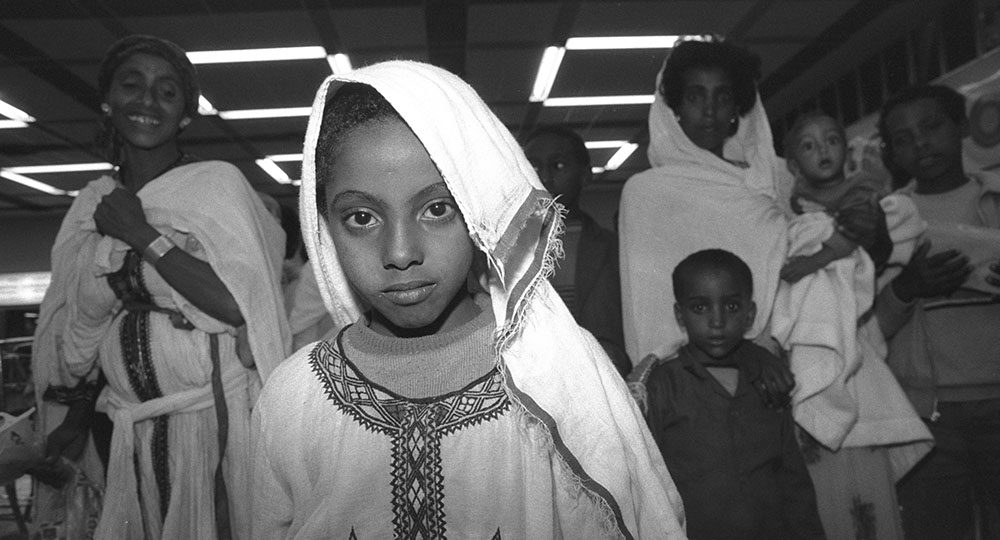Operation Solomon
Many questions have been asked recently about the Jewish people in Ethiopia and their immigration to Israel. These Ethiopian Jews are sometimes referred to as the Falashas. Who are they? How did they become Jewish? Are they the lost tribes?
In 1984 and 1985, there was a massive airlift of Ethiopian Jews to the land of Israel. Over a period of a few months, approximately 8,500 were taken to Israel in Operation Moses. But Operation Moses ceased when information about it was leaked to the press. The Ethiopian Jewish community in Israel has been very interesting. I’ve met and talked with some of them, and they are loyal to the State of Israel and very religious.
In May 1991 another operation was undertaken—Operation Solomon. It was, in some ways, even more amazing than Operation Moses. Within a time span of 24 hours, there was a massive airlift of 14,400 Ethiopian Jews to Israel. Many El Al jumbo jets were used. A world record was set when one 747 ferried over a thousand Ethiopian Jews to Israel. They have joined their relatives and friends, and now the Ethiopian community in Israel numbers about 35,000. There are still almost 2,000 Ethiopian Jews behind rebel lines in Ethiopia, but there is hope that someday they will be able to join their brothers in Israel.
Who are these people? Some have suggested that they may be one of the so-called “lost tribes.” You will remember that the ten northern tribes of Israel were taken into captivity in 622 B.C. As the rabbis have speculated about who these Ethiopian Jews are, some have said that they are the lost tribe of Dan. There is very little to substantiate this view. As a matter of fact, no historical evidence exists for this idea at all. The northern tribes of Israel were deported into Assyria (northern Iraq). Ethiopia is more than a thousand miles south of Israel!
On the other hand, the Ethiopian Jews’ belief about themselves, about their own community, is very fascinating, because they connect themselves to a biblical event. First Kings 10 tells of the visit of the Queen of Sheba to Solomon. She came, saw the wonders of his kingdom, and declared, “the half was not told me” (1 Ki. 10:7). She gave Solomon gold and then returned to her own land. The land of Sheba is either in Ethiopia or across the Red Sea in the southern part of Arabia, but scholars agree that the Queen of Sheba ruled over the area known today as Ethiopia. So the Ethiopian Jews’ belief about their own origin is that when the Queen of Sheba returned, she took back Jewish teachers and scribes who taught the knowledge of the one true God to the Ethiopians, and many of them became followers of or proselytes to the God of Israel. This tradition seems to be a more likely explanation for the origin of the Ethiopian Jews—that they are the children of proselytes. They are devoted to the God of Israel, very faithful and very religious.
We know that their origin predates the New Testament for several reasons. First, the Jewish practices of the Ethiopian Jews are not affected by any of the rabbinic practices that developed in New Testament times and beyond. They have no knowledge of some of the rabbinic laws that were enacted after the end of the Old Testament period. They know only Old Testament Judaism. Therefore, their origins can be dated before the coming of Christ. A second reason why we know that their origins are ancient is a fact that also connects them to the New Testament. In Acts 8 we read the account of Philip and the Ethiopian eunuch. The eunuch was an official in the queen’s palace in Ethiopia, and he had been up to Jerusalem to worship. Why had he been up to Jerusalem to worship? Because he was Jewish. He had gone up to one of the pilgrim festivals in Jerusalem, and, on his way back, he was reading Isaiah the prophet. He was probably thinking about some of the things he had seen and heard in Jerusalem, and the Scripture indicates that Philip came, preached the gospel to him, and led him to the Messiah. So here is an Ethiopian Jew in the pages of the New Testament.
The Ethiopian Jews are sometimes referred to as Falashas, but that name probably should not be applied to them. It is a derisive term by which other Ethiopians referred to them in the Middle Ages. It means outcast or stranger. They call themselves the Beta Israel (house of Israel). It is better, therefore, not to refer to them as Falashas, which is a name of derision, but simply as Ethiopian Jews.
They are truly a fascinating group. Although more primitive than modern Jews because of having lived in the mountains and undergone persecution for a long time, they are very religious and deeply committed to the God of Israel. They are also faithful and loyal Israelis and are fitting into Israeli society very well. In fact, many of them serve in the Israeli military.
Some of the rabbis have a problem with their background and want them to go through a special ritual cleansing ceremony of immersion because of the uncleanness they think is attached to them. Of course, the Ethiopians resent this practice, particularly when they have been much more loyal to the teachings of the Word of God than most Israelis. But everyone in Israel accepts their Jewishness and welcomes them home.
Can you imagine the tactical challenge of incorporating 14,400 people into a country in the space of 24 hours? But Israel is committed to the “ingathering of the exiles” and has spared no expense to bring them home. As William Safire has remarked, “Thousands of black people were brought to a country not in chains but in dignity, not as slaves but as citizens.”
The Bible speaks about Ethiopia. One such passage is a reference to a return of Jews from Ethiopia and may very well refer to the Beta Israel—Ethiopian Jewry: “From beyond the rivers of Ethiopia my suppliants, even the daughter of my dispersed, shall bring mine offering. In that day shalt thou not be ashamed for all thy doings, in which thou hast transgressed against me; for then I will take away out of the midst of thee those who rejoice in thy pride, and thou shalt no more be haughty in my holy mountain” (Zeph. 3:10–11).
Only time will tell if the remaining 2,000 Jews still in Ethiopia will be able to return to their ancient homeland. But we can thrill at their preservation through the years, at their connection to both the Old and New Testaments, and at the heroic way in which Israel has responded to the need of Jews all over the world. Keep in mind that people are Jews, in the modern Jewish sense of the term, not because of racial identification with Abraham, Isaac, and Jacob, but because they belong to a people. Many, many years ago these Ethiopians joined the people of Israel, and they worship the same God as the Jewish people. Although they are sons of converts (proselytes), they are fully accepted as Jews, in every sense of the term, in the land of Israel.








I watched a movie about Ethiopian Jews being smuggled out of Ethiopia via Sudan by Israeli agents posing as the operators of a hotel. Is the movie based on a true story? Also, there is a scene where it was stated that the Ethiopian Jews were descendants of a child born to King Solomon and the Queen of Sheba. Is there any validity to that?